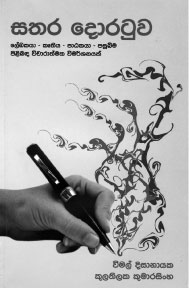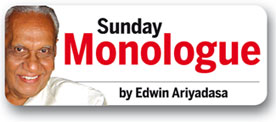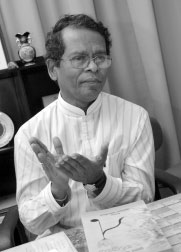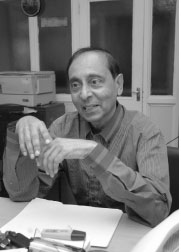 Dons delve into literary criticism Dons delve into literary criticism
 Ambiguity is very much a part of the prosodist's armoury. Ambiguity is very much a part of the prosodist's armoury.
When a creative expression yields layers of ambiguous meanings, it
invariably tickles and titillates the imagination of the aficionado.
The joint discourse of the duo of dons, focused upon here, has a
title that tends towards ambiguity.
The work is named "Satara Doratuwa". This Sinhala usage could be
interpreted either as 'Four Gateways' or The Portal to Knowledge.
In their forward, the two authors provide an exegetical note about
the title and the intent of their exercise:
"Literature is like a vast mansion. There are four doorways to enter
it. Those four are the writer, the work, the reader and the ambience.
Our effort in this work is to provide a comment on these four concepts.
In consequence, we decided to call this book "Four Gateways". The title
of the book could be interpreted in another way too - that is as the
portal opening to literary knowledge." The work proceeds to explore the
intricate inter-relationship between those four forces that facilitate
entry into the mansion of literature.
As things are, the conducting of a sustained discussion on such a
profound and complex issue like ramified literary criticism, is a
daunting task indeed.
They have set up a format, to meet this challenge head on. The work
is composed as a dialogue, in which the give-and-take is between Prof.
Wimal Disanayaka and Prof. Kulatilaka Kumarasinghe.
Both these personalities are men of considerable academic stature and
are known for their unswerving pursuit of scholarship.
Of the due, Wimal has a globe-girdling reputation as an exceptionally
articulate exponent of the theoretical aspects of communication and
allied issues. In spite of the fact, that he has scaled daunting
academic heights, he has never ceased exploring.
Prof. Kulatilake Kumarasinghe, who seems to assume the role of
interviewer in the current dialogue, displays a felicitous capacity to
move with perceptible ease, in the arena of advanced thought in literary
criticism.
It has to be said unambiguously that, the present dialogue is a
wholesome Sinhala contribution to the proper understanding of the
essential areas of theoretical literary criticism.
The work could have easily deteriorated into an intimidating display
of erudition and overpowering bookishness. Instead it has evolved into a
clear-cut discourse on the predominant theories of literary criticism
and the avowed postures of some of the outstanding schools of thought in
this specific field.
The structure of the work has helped immensely the disciplined
mustering of the available plethora of material. The book is divided
into four parts, reflecting the four doorways that provide entry into
the magnificent mansion of literature. Under each section the relevant
quantities of knowledge are amassed, after they have been duly processed
for easy consumption by the reader. The joint authors make it clear in
their foreword, that they fully imbibed the difficult tomes of the
authorities in this field and presented the predominant notions in them
to enable these to be readily grasped by the Sinhala reader.
In the history of literary criticism, the prioritizations veered from
time to time. In the present dialogue the joint authors, offer
centre-stage to the writer'.
The structural style of the book, enables the reader to keep track of
the argument as it progresses from stage to stage. One of the due makes
a point. The other, either counters it or substantiates it. This form of
procedure, imparts a liveliness to the discourse. This swing of the
pendulum, instils a welcome vitality and elan to the total work.
 |
|
Prof. Kulatilaka
Kumarasinghe. |
 |
|
Prof. Wimal Disanayaka |
The reader invariably discovers, that the interchange of views
between the two authors, is exceedingly stimulating. In the initial
segment of the book, the joint authors establish that, in an earlier era
'creation' was predominant over the 'creator', who remained anonymous,
for the most part. According to them, it was in the post-renaissance
world, that the phenomenon of "personality", began to assert itself.
What is highly significant about this whole discourse, is that, views
are not at all introduced with a dogmatic stubbornness. As there should
invariably be in any liberal discussion, there is in this presentation,
ample room for reservation, hesitation and healthy doubt.
This book places marked emphasis on the role of the ambience, in the
production of creative work. The authors point out that, in the current
milieu of literary criticism, the significance of the ambience is
stressed to such an extent, that, the background has turned out to be
the foreground.
In the course of their dialogue, the two dons make references to such
schools of literary critisicm as 'New Criticism', 'Structuralism' etc.,
providing testimony to their level of "trained frequentation' of this
field.
The book enlightens the Sinhala reader, as no other work has done
hitherto, especially by "de-mystifying" the esoteric generally
associated with the theories of modern literary criticism.
My considered view of the matter is that, the book by Wimal
Disanayake and Kulatilaka Kumarasinghe, is the most important
contribution to Sinhala learning, in the field of advanced literary
criticism. Their vocabulary enriches the Sinhala language.
But, I have a mild hesitation, though. Incidentally, it may not be
that mild either.
Generations of scholars and savants, have evolved theories and norms
relating to proper literary communication. For ages they have worked
with utmost care and aplomb. But, as Wimal may very well know, in some
instances, today's social media, have brought into being a category of
miscreants, that could be characterized as "communications terrorists".
With scant regard even for the basic tenets of the civilized practice
of communication, these "Communications Terrorists", destroy reputations
with impunity, utterly abusing the freedom available for expression in
social and digital media.
The harm wrought by these terrorists, raised wave after wave of
sympathy, worldwide, when the tragedy of four suicides of young American
students, all below 18, was reported recently. They were all pathetic
victims of bullying through social media. And, it all happened within 19
days. The impact of such "terrorism" is so extensively felt, that a
research project is being conducted about this kind of bulliying, in
collaboration with the University of Hawaii.
My point is, a new phase of literary criticism is urgently called for
to curb the human tragedy caused by this "communications Terrorism", in
the era of social media. The joint-authors of Satara Doratuwa, could add
a fresh chapter on this issue, when they continue their esteemed
discourse.
|

